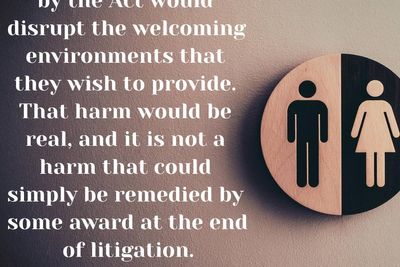Trauger issues injunction: businesses won't have to post state-mandated anti-trans signs—yet
Federal District Court Judge Aleta A. Trauger today issued a preliminary injunction against a new law in Tennessee that required businesses and other entities that allow transgender people to use the public restroom that matches their gender to post a gaudy warning sign government-prescribed warning sign. This is however a temporary victory pending the outcome of the case.
The lawsuit that led to the injunction, Bongo Productions LLC et al v. Lawrence et al, was filed on behalf of business owners Kye Sayers and Bob Bernstein. Sayers and Bernstein objected to being forced by the state to display a "stigmatizing message" which they claimed in the suit violates the First Amendment. The court had been asked for a preliminary injunction to stop enforcement of the law while the lawsuit proceeds, which the judge today granted.
In granting the injunction, Trauger recognized that "Restaurants and performing spaces are businesses, but that is not all they are; they are also among the most important physical locations in which communities — so often consigned, in this era, to electronic space — can gather and grow together in a manner rooted in a particular neighborhood, in a particular city, in a particular state. The plaintiffs have presented evidence that they have strived to be welcoming spaces for communities that include transgender individuals and that the signage required by the Act would disrupt the welcoming environments that they wish to provide. That harm would be real, and it is not a harm that could simply be remedied by some award at the end of litigation."
"This law is bad for businesses in Tennessee and most importantly harmful to transgender people," said Hedy Weinberg, ACLU of Tennessee executive director. "We are glad the court saw that this law is likely unconstitutional and hope that the state gives up the wasteful effort to defend discrimination and a violation of the First Amendment."
Nashville LGBT Chamber of Commerce CEO Joe Woolley and his organization have been fighting this law since it was filed. "The LGBT Chamber is proud that so many of our members stepped forward and offered to challenge this case and we are happy to work with ACLU in this process. We are thankful for the businesses chosen for standing up to discrimination and doing what's right."
"This law puts a literal target on the front doors and bathroom doors of businesses that are just trying to serve their customers with welcoming inclusive policies," Woolley added. "The additional burden it puts on businesses for being inclusive is appalling and wrong, our legislature should be focused on helping businesses succeed, not making more unneeded bureaucracy for them to fight and money to spend on regulations. That so-called 'pro-businesses' republicans passed this unneeded and unclear piece of legislation, shows they are not truly for businesses, small or large."
"I am glad the court saw that forcing businesses to display a sign that hurts transgender and intersex people is unconstitutional," said Kye Sayers, owner of the Sanctuary, a performing arts and community center in Chattanooga, in response to news of the injunction by Trauger. "These signs would have damaged our businesses and the environment we have tried to create for our community, customers, and staff."
"I'm happy that the court stopped this invasive and decisive legislation for now and am hopeful this leads to a permanent ban of an unconstitutional violation of my freedom of speech rights," said Bob Bernstein, owner of Fido, a restaurant in Nashville.
As the case moves forward, however, it is altogether possible that the injunction could be lifted, and businesses may still be forced to display the signs. Activists and organizations will continue to oppose this and similar measures in the meanwhile through whatever means they have available.
"The ACLU's court challenge will show our community that the fight that began during the legislative session continues," said Christopher Sanders, executive director of the Tennessee Equality Project. "We are grateful to them and to the plaintiffs for all their work to overturn this stigmatizing law."
